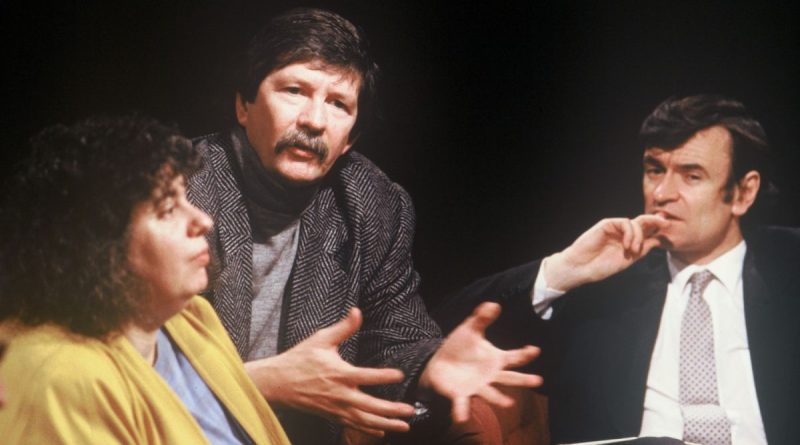The man who invited the world to dinner at his home | The State
Jim Haynes was an icon and relic of the 1960s London cultural movement known as Swinging Sixties, an American in Paris who was famous for inviting hundreds of thousands of strangers to dinner at his home.
He died this month, but I was still able to see him in person before the covid-19 pandemic hit.
Last February, I made my last trip abroad before the lockdowns arrived.
I bought a last minute ticket and hopped on the Eurostar that takes you from London to Paris, motivated by a sudden urge to dine with a friend.
Jim Haynes had turned 87 and his health was declining, but he knew he would welcome a visit.
To Jim he loved having guests.
The essence of that trip now seems the antithesis of what happens in times of the coronavirus.
I wasn’t the only guest wandering through the warm glow of his 14th arrondissement on a damp winter night.
Open door policy
Inside, people were crowding together, shoulder to shoulder, from the narrow kitchen.
Strangers struck up conversations, huddled in groups, balancing their dinners on paper plates and taking turns reaching for the wine box.
Jim maintained an open door policy at home every Sunday night for over 40 years.
Absolutely anyone was welcome to attend a casual dinner.
All I had to do was call or send an email and he would add his name to the list.
No questions were asked.
You just had to put a donation in an envelope upon arrival home.
There was always a murmur in the air, while people of various nationalities (locals, immigrants, travelers) crowded into the small, open space.
A pot of hearty food was bubbling on the counter and portions were served on a trestle table, so you could help yourself and keep chatting.
There were good reasons to nickname Jim the “godfather of social networks”.
He was a pioneer in connecting strangers, long before we all outsourced this practice to Silicon Valley companies.

I only met Jim in his later years, but his whole life was extraordinary.
He was born in Louisiana in 1933 and lived in Venezuela starts from its adolescence.
He is the founder of the Arts Lab alternative culture center in London, where he rubbed shoulders with David Bowie, John Lennon and Yoko Ono.
He also directed a sexual liberation magazine in Amsterdam.
And he did it all before he became university professor of sexual politics in Paris, his home since 1969.
And yet he was often mistaken for a Scotsman, after spending an influential period there between the late 1950s and late 1960s, when he opened Edinburgh’s first pocket bookstore, co-founded the Traverse Theater and helped put in Fringe festival is on.
When Jim died, aged 87, earlier this month, an obituary from Herald He called it “the managernot official of the Beat Generation in Scotland ”.
The Beat Generation It is made up of a group of American writers from the 1950s.

Although many high-profile people tend to turn to their closest friends after success, Jim never stopped expanding his circle of acquaintances.
The first time I heard from him was through an email, which came to me suddenly in 2008.
He had written an article in a newspaper talking about Barcelona, not that of Spain, but the one from the coast of Venezuela, and it had brought back memories.
His father worked in the oil business and had moved the family there when Jim was a teenager.
My article was about how to meet people through the website of Couchsurfing, where locals open their homes to strangers for free around the world.
Cultural exchange
This was before AirBnB figured out how to monetize the idea and the concept of non-commercial cultural exchange appealed to Jim.
“When you get back to Europe, come for dinner,” he wrote, promising to tell me about an old travel project of his own that he thought I might like.
Intrigued by the invitation, I headed to Paris.
I had imagined some kind of intimate dinner with the cultural elite, but what I found was more like a party in a student house, although with more mature assistants and with a moderate consumption of alcohol.
Jim was a teetotaler and the spirits ended strictly at 11:00 PM.

Jim instantly greeted me like an old friend, and as we chatted, he walked over to the shelves in his living room to offer me a book.
“People to People” read on the cover.
It was the project he wanted to tell me about.
He told me that in the late 1980s, he had created a series of guides for the countries of the Iron Curtain.
But instead of the standard descriptions of attractions and hotel listings, the format was like an address book that included the contact details of hundreds of potential hosts in the country.
The idea was that if people couldn’t see the Western world for themselves, he was taking it with him via travelers.
It was “couchsurfing”, but without internet.
The pocket-size copy he put in my hand was about Poland.
I loved the idea and decided to travel there to see if the people on the list were still willing to receive random visitors, even though things had changed a lot.

Each person was listed in the city where they lived, followed by two or three lines, including your address, date of birth, phone number, and hobbies.
Using Google and postal mail at the same time, I was able to contact several of them.
Most had met Jim personally or through friends of friends.
Local guides
They all had fond memories of the project and were still willing to act as local guides to show me around.
In Gdansk, I asked the civil servant Krystyna Wróblewska why she had signed up for this project.
She told me that she had been working as a mediator, helping journalists cover the anti-communist strikes at the shipyards.
“They [los medios] they went looking for women with headscarves and horses with carts, perpetuating the same image as always. I guess i wanted meet people to change stereotypes and show that not all the images you have in your head are real, “he said.

“I was surprised at how easy it was,” Jim told me.
Produced guides for Romania, Czechoslovakia, Hungary, the Baltic States, and Russia, with thousands and thousands of locals.
Some of his contacts came from his personal multi-volume address books, and he gained new records after publishing interviews in local newspapers and jazz magazines.
Mail bags
“Some of the older Russian people were afraid of being put on a Western list, because they thought it would be easier to stop them all. But a lot of young people wanted to be in the book. I received whole bags of mail. I’m sure the local postman was wondering what the hell was going on, ”he said.
Over the years, authorities often wondered what was going on at Jim’s home.
Especially during the period when issue toy passports.
It was in the 1970s, after hearing the story of an American traveler who, 20 years ago, had renounced his American citizenship and created his own “world passport.”
For Jim, non-national passports were in line with his ideals of global peace and freedom.
So he turned his house into an “embassy” and started producing world passports for anyone who wanted one.
The documents were so compelling that some people used them to cross borders.
“Look, you can’t do this anymore. You have to stop making passports, ”the exasperated French police told him when he arrived at his door.
But Jim continued until he ended up in court.
Although he was eventually cleared of fraud and forgery, he was convicted of “misleading the public.”
Jim always dismissed the idea that it was a naive undertaking, but according to some of his friends, he was overconfident and this led him to financial mistakes and legal problems over the years.
But he only dealt with problems when they broke out.
“He often had to prevent me from signing things. Sometimes he wouldn’t even read them, ”says Jesper, his son, who was born during Jim’s marriage to Viveka Reuterskiold in the 1960s.
“There were mattresses in every empty space on the floor, people sleeping everywhere,” he says, recalling his visits to Paris.
“It was exciting and fun, but sometimes I was jealous. It happened to a lot of people. People were very possessive of him. People wanted to claim it, but it was impossible to claim ”, he says.
Jesper acknowledges that his father opened up to the world.
He used Jim’s contact books extensively while traveling and currently lives with his own family in Bangkok, where he briefly replicated Sunday dinners.
“Only for six months. It was a lot of work ”.
Bloggers
During the 1990s, the crowds began to diminish at Paris dinners, as the original hippie crowd aged.
But then a new wave of younger visitors began to get in touch.
That’s when bloggers found out.
“The Internet ruined and saved dinners at the same time,” says Seamas McSwiney, a close friend who for decades helped out on Sunday nights.
“They got less spontaneous as people tried to book six months in advance, which was anathema to the way Jim traveled and was also annoying because those people were more likely not to show up, but at the same time , These online articles revitalized idea. There was a younger audience and a new momentum, “he says.
At the peak of the dinners, Jim would welcome up to 120 guests, filling his atelier and spreading out into the cobbled back garden.
It is estimated that 150,000 people attended these dinners over the years.
“The door was always open”says Amanda Morrow, an Australian journalist who stayed with Jim for a year and a half.
“It was a revolving door of guests: some wanted to stay and others just wanted to say hello. Jim never said no to anyone. The only thing that really depressed Jim was for people to leave “says Jesper.
“He fought against it. He didn’t like being alone. Although, fortunately, there was always someone new to distract him.

In recent years, Jim sat quietly, while others gravitated in his orbit.
On my last visit, you could see fragile and afflicted with various ailments, but he also had an air of satisfaction.
He clearly never tired of connecting people.
“I was wondering when you would come back,” he told me, in the harsh American accent that somehow he had never lost.
He was a man who had spent time with Lennon and Bowie, who was once friends with Sonia Orwell and used to walk around Paris with Samuel Beckett.
And yet made everyone feel special. Every connection mattered.
“It seemed like the trick politicians use, but it was natural,” says Seamas.
Covid-19 restrictions recently cut dinner hours, but his friends say the pandemic didn’t depress him.
He was sure the meetings would resume, and meanwhile he enjoyed a smaller flow of visitors and, whenever possible, friends.
Amid the avalanche of tributes to his figure since he died on January 6 while he slept, these words from Jesper stand out: “His goal from the beginning was to present to the whole world. I almost did it”.
Now you can receive notifications from BBC News Mundo. Download our app and activate them so you don’t miss our best content.


